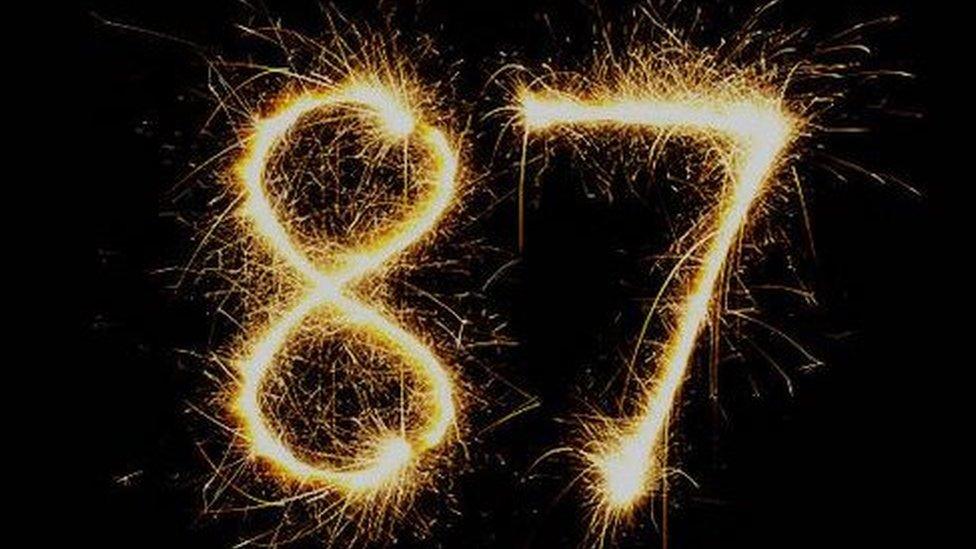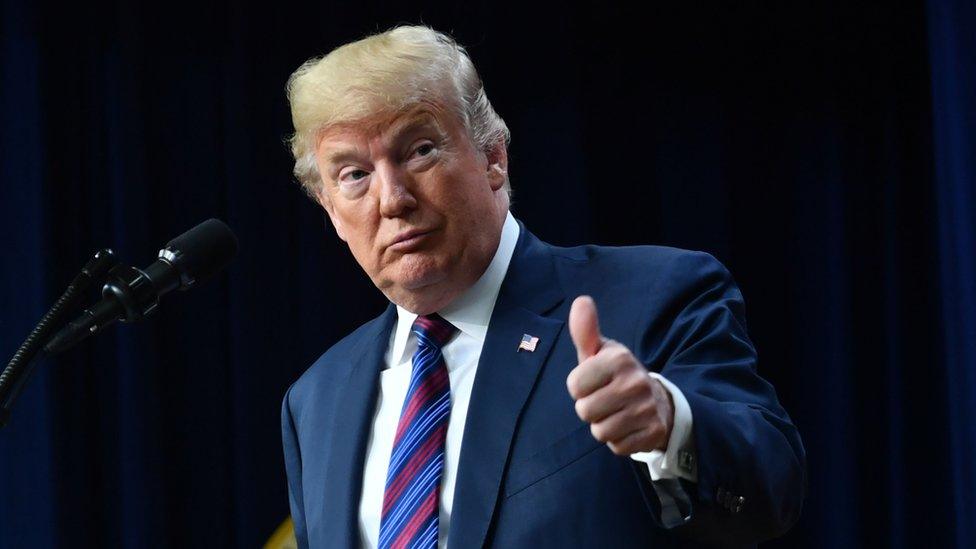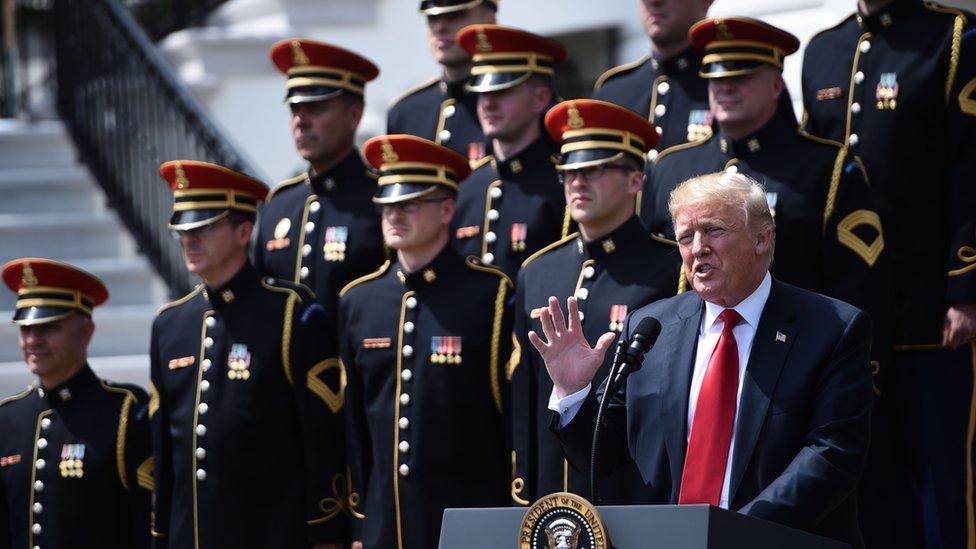The one Trump statistic that explains everything
- Published

The Republican Party is Donald Trump's party. If there were any doubts about this, recent polling - which shows the president with near record levels of backing from Republican voters - confirms the fact.
According to a recent Gallup Poll, external, Mr Trump's support among members of his own party at the 500-day mark of his presidency sits at 87%, second only to George W Bush's 96%, which came nine months after the September 11 World Trade Center attacks.
A handful of other presidents since the survey started after World War II - George HW Bush, John F Kennedy, Dwight D Eisenhower and Richard Nixon - were also in the 80s, statistically even to Mr Trump's mark.
Only Gerald Ford (59%), Jimmy Carter (54%) and Harry Truman (46%) are significantly lower than the pack - and two of those men took over from a president who resigned (Richard Nixon) or died in office (Franklin Roosevelt).
Why Mr Trump's number is crucial
In the past, an 80% mark at this point would be of little note. Presidential support within their own ranks can ebb and flow, but they are the de facto leaders of their party and, particularly early in their first term, command allegiance and set the course for politics and policy.
At the moment, the US economy is rolling along, unemployment is down, the stock market is rising and the nation is at peace - key benchmarks that determine positive presidential approval, particularly among the incumbent's party faithful.

Mr Trump's case, of course, is a bit different. He was publicly opposed by some members of his own party throughout the course of the 2016 primaries and even into the general election.
The National Review, a bastion of conservative institutional memory, published an entire "Against Trump" issue in January 2016. Two months later 2012 Republican nominee Mitt Romney denounced the candidate as a phony and a fraud. Speaker of the House Paul Ryan cancelled a public rally with Mr Trump a month before the election and privately told fellow Republicans to distance themselves from their nominee.
Since becoming president, Mr Trump has faced fierce resistance from Democrats. A majority of independents remain unimpressed by his administration.
Republicans, on the other hand, have largely fallen into line.
"There is no Republican Party," former Republican Speaker of the House John Boehner said at the Mackinac Policy Conference in Michigan last Thursday. "There's a Trump party."
And with the party comes the power - as demonstrated in three important ways for Mr Trump.
1. Setting the agenda
Beyond one noteworthy poll, if there's a key piece of evidence that the Republican Party now belongs to Mr Trump it's in his ability to change the debate on an issue dear to his heart, trade.
For years the Republican Party had been the home for free-trade advocates who view global capitalism and economic competition as beneficial to US businesses and the economy as a whole.
Mr Trump, on the other hand, sees trade as a zero-sum contest where any imbalance in favour of foreign countries means US dollars - and jobs - lost.
How hogs and Harleys became weapons in a looming trade war.
That kind of talk would once be heresy outside of the marginalised factions of the party loyal to right-wing populists like columnist and occasional presidential candidate Pat Buchanan. Republicans in Congress over the past two decades have supported free-trade legislation 92% of the time, according to a 2017 study, external.
Now, as the president beats the drums of trade war - imposing steel and aluminium tariffs on allies like Canada, Mexico and the European Union - the party is largely marching in step.
There has been grumbling from Republicans in Congress over the trade moves, but there seems to be little chance of majority support for any efforts to check the president's policies. The libertarian-leaning Koch brothers are using some of their financial muscle to campaign a pro-trade agenda, but their proposed advertising campaign seems more like friendly advice for the president, rather than all-out policy warfare.
As for Republican voters? They're largely on board.
A March Quinnipiac Poll found, external Republican approval of "the way Donald Trump is handling trade" at 69%, with 58% backing for the proposed steel and aluminium tariffs.
"It's not going to be free to win this war, but it may be worth it," a Republican walnut-grower in California told the Los Angeles Times, external. "I don't think you'll have farmers go out and vote for Democrats over tariffs."
He said that even though China recently imposed retaliatory tariffs on all US walnut exports.
During his first year in office, Mr Trump followed his party's congressional leaders in pushing for legislation repealing Obamacare and lowering taxes. Now, Mr Trump is pushing his trade priorities - and it's the rest of the party that is following.
2. Challenging Robert Mueller
Unified Republican support also gives Mr Trump the freedom to be more aggressive in challenging special counsel Robert Mueller's investigation into possible ties between the Trump 2016 presidential campaign and the Russian government.
Over the past few months the president has been actively chipping away at the legitimacy of the probe. He and his surrogates have questioned its constitutionality, accused its staff of political bias and decried its duration and cost.
In the most recent volley, Mr Trump has said he has "absolute right" to pardon himself - a line of argument advanced by his lawyers as a means of defending the president from any efforts by Mr Mueller to charge the president with obstruction of justice or compel him to talk to investigators.
Are presidential pardons Trump's secret weapon?
Poll numbers show that Republicans are rallying behind the president's escalating war with the special counsel. From July 2017 to April 2018, according to a Monmouth Poll, external, support for continuing the Russia probe among Republicans has declined from 35% to 18%, dropping nearly 10 points over the last month.
If Mr Mueller targets the president or his inner circle, whether through indictments or a referral to Congress for possible impeachment, the president will need his party behind him. Those battle lines are already being drawn, and Republicans are overwhelmingly casting their lot with Mr Trump.
3. Deciding mid-term election strategy
Mr Trump's robust poll numbers among his party will also help dictate how the president handles the upcoming mid-term elections for Congress, state legislatures and nearly a dozen key governorships.
If Democrats largely revile the president and independents aren't particularly enamoured either, the key to limiting electoral losses for the party will be to boost turnout from within Republican ranks. That means more red meat for the partisan base - including immigration horror stories, sweeping condemnation of liberal policies and full-on warfare on hot-button cultural issues.
Back in February, a White House source told the website Axios that the president planned to identify "unexpected cultural flashpoints" and exploit them in the run-up to the mid-term elections.
Provoking a debate over whether MS-13 gang members are "animals", decrying a media bias and attacking liberal comedians like Michelle Wolf and Samantha Bee and rekindling the NFL national anthem protest battles of 2017 would fit with this strategy.
His new feud with the Philadelphia Eagles football team, during which he has questioned their patriotism and loyalty to their fans, could be just the latest twist.

After cancelling a White House reception for the Super Bowl champion Philadelphia Eagles, Donald Trump holds a "celebration of America" on the White House lawn
Many past presidents, after taking office, have attempted to expand their base of support to make governing easier and smooth their path to re-election.
Given the fierceness of Democratic resistance from day one of the Trump presidency (due, in part, to the president's scorched-earth presidential campaign), that avenue may be closed to him.
Then again, that sort of thing was never his style. The mid-terms will be brawl, and the president will try his best to stoke Republican anger.